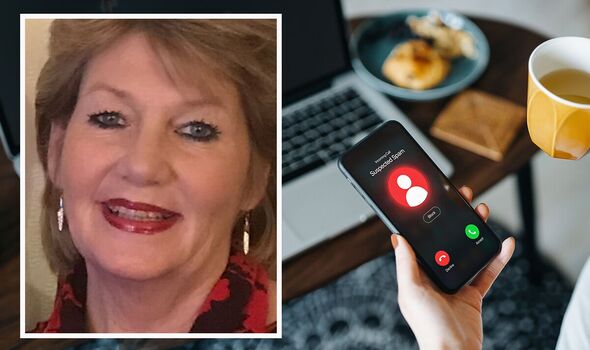
A woman was tricked out of £1,000 through a “sophisticated” scam phone call leaving her “not knowing who to trust”.
Like many retired professionals, Valerie Lown, 66, from Gloucester, said she considered herself to be “internet savvy”. However, this didn’t prevent her from falling into the fraudsters’ trap in the run-up to Christmas 2022.
The grandmother-of-four said: “A man called me from my bank’s so-called fraud department saying that there was suspicious activity on my account and that someone has withdrawn £1,000.
“Immediately feeling very uneasy, I asked a few questions to clarify the situation and he asked me to call the number on the back of my bank card for extra security, which I did.
“It was the same man who answered the phone and after going through all the security checks, he said someone is attempting to take another £1,000 and not to call back again within the next 30 minutes.
“I put the phone down and instinctively knew something wasn’t right so I called my bank through a different number.
“They confirmed that £1,000 had been removed from my current account and another was in the process of being stolen, which thankfully they were able to stop.”
Despite never disclosing security details initially, the scammer had managed to find out Ms Lown’s bank password and mother’s maiden to make the first withdrawal.
Through the bank, Ms Lown was able to get her money back but it took months rather than days under the new regulations introduced in October.
She said: “At the end of my ordeal I didn’t know who to trust, I was taken in by very sophisticated people without even giving away anything.”
Free consumer scam platform Ask Silver said this is a crime it regularly sees and predicts will only increase.
Ask Silver is an AI-powered scam checker, which enables anyone to check if a text, email or letter is a scam or not.
It is available for free inside WhatsApp and is like any other phone contact that can be messaged. It allows users to send through a screenshot of anything that needs to be checked, and can even report scams to the correct authorities with one tap.
Alex Somervell, co-founder said: “By reporting incidents through Ask Silver the general public can play a direct role in disrupting criminal networks and help stop them from committing scams like this in the future, our aim is to reduce the number of scams so that people like Val can feel safe and confident again.”
Ms Lown said: “Letters and texts come in from all sorts of companies to me, NHS, Netflix and Amazon – all written well and asking for information in very subtle forms. The internet is great but it’s also full of con artists, people need to be careful and don’t be taken in like I was.
“I am still being targeted by strange emails to this day, I think I must be on a scam hit list somewhere – but I feel more at ease with the Ask Silver platform to hand in my back pocket.”
Mobile phone scams continue to be a widespread issue, with 5.7 million Britons targeted by a mobile phone scammer 10 or more times according to new research by Uswitch.com, the comparison and switching service.
Simrat Sharma, mobiles expert at Uswitch.com, commented: “Scams are becoming increasingly sophisticated, from AI voice cloning to video deepfakes, making it more difficult than ever for consumers to spot them and stay protected. People of all ages should be vigilant when answering unexpected calls and never share personal or financial information over the phone if you do not know the caller. If you have any doubts regarding a call, our advice is to ‘Stop, Check and Call Back’.”
To ensure the person or company being called back is legitimate and that malware has not been installed on the phone to mimic a dial tone, Mr Somervell tipped: “The best thing to do is either call someone you know first on the same phone, just to ensure it’s not being redirected to the scammer, or use a different device to call back on.”

















